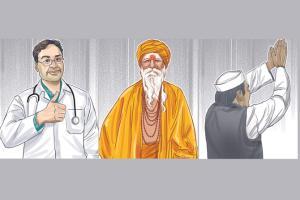There's a problem with judging people by how they look. More often than not, you will be wrong

We do live by stereotypes. We judge temperament and character from what a person is wearing. Illustrations/Ravi Jadhav
 Man in a white coat, stethoscope around his neck. Who is he? A doctor. A man you can trust. Bare-chested man with three horizontal white stripes of dried ash on his forehead — Tam Bram, probably Iyer, probably speaks English with a hilarious Tamil accent. Distinguished-looking gentleman in a suit speaking polished English in a grave baritone — probably a captain of industry, a man of integrity, probably richer than everyone else in the room.
Man in a white coat, stethoscope around his neck. Who is he? A doctor. A man you can trust. Bare-chested man with three horizontal white stripes of dried ash on his forehead — Tam Bram, probably Iyer, probably speaks English with a hilarious Tamil accent. Distinguished-looking gentleman in a suit speaking polished English in a grave baritone — probably a captain of industry, a man of integrity, probably richer than everyone else in the room.
ADVERTISEMENT
Fellow in a lungi with a bushy beard of curly hair around a clean shaven face — follower of Islam. Probably okay, but why take chances? Some of us take it a dangerous step further — we convince ourselves that girls in mini-skirts, jeans or jean shorts are of loose moral character and probably looking for sex. Probably need to be given a good scare and brought into line.
We do live by stereotypes. We judge temperament and character from what a person is wearing, we equate good looks with intelligence, we trust grey-haired folks who measure their words more than young millennials with pompadour haircuts who speak in incomplete sentences.
Stereotypes serve a purpose by serving as a social shorthand. A teacher is assumed to be knowledgeable, reasonable, good with children and probably poorly paid, but automatically respectable. There’s a good reason why so many advertising commercials use a spectacled man in a white coat with a stethoscope around his neck. His medical advice will be believed even though everyone knows he’s only a paid model.
I consider myself a critically reflective man who can detect and avoid derivative viewpoints and arrive at my own conclusions about things. But a single incident about eight years ago made me realise how vulnerable I was to exactly the same stereotyping errors as everyone else.
The journey from Nairobi, Kenya to Lusaka, Zambia, where I was to join a new job and live for several years was just about three hours long. I was flying a small Kenya Airways plane with seats in pairs; I had a window seat in row 1. The aisle seat was empty; I hoped it would remain so.
Shortly before the doors closed, my fellow passenger came — a tall man with a seriously long beard, fresh orange markings on his forehead from recent communication with his god, and flowing robes. An orange scarf was around his head and a garland of prayer beads around his neck. My heart fell; I just hoped he didn’t have ascetic Hindu body odour as well from never using soap or deodorant. I studiously looked out on the tarmac as he sat down.
Soon after the plane took off, I fixed my Bose headset around my head, shutting off all possibilities of unwanted casual conversation. But when my lunch was served, vegetarian as requested, I decided to put my headset and its trailing wires away. My neighbour seemed to be tucking into a no-holds-barred meal with lamb curry and a can of Heineken. I was disgusted at the godman’s hypocrisy.
As coffee was being served, he spoke. His voice was unexpectedly soft and urbane, his language very well-spoken English. “And where are you bound, sir?” he asked me. I replied, frostily but civilly; he asked another question; I asked one of mine; and pretty soon, we were in conversation. His name was Parvez Handa. As a civil engineer, he had been posted to Africa by his employer to help Zambians with Indian technology for extracting copper from their many mines. He had already been here two years without a break. I listened, my mind brimming with shame at how thoroughly I’d misread this man.
Finally I gathered the courage to ask him about his long beard and robes. His contract did not include vacations to be with his wife and children, far away in India. He missed them terribly. Two years earlier, he had decided not to shave or cut his hair till he saw them next. The loose robes were just comfortable. I felt rebuked by reality, but the story wasn’t quite over. Getting a visa at Lusaka airport required me to pay $50 in cash, which I didn’t have. The ATM was outside the Immigration area. I was truly stuck. I heard Parvez Handa’s soft voice again. “Something wrong?”
I explained my predicament.”No problem at all,” he said, withdrawing $50 from his pocket. “How will I pay you back?” I asked him. “Help someone else some other day,” he said and disappeared. Parvez and I are Facebook friends now, and we stay in touch. He is back in India, with his family. He is one of a long list of people the universe brought into my life to teach me a lesson, not for worse but for infinitely better.
Here, viewed from there. C Y Gopinath, in Bangkok, throws unique light and shadows on Mumbai, the city that raised him. You can reach him at cygopi@gmail.com Send your feedback to mailbag@mid-day.com
Catch up on all the latest Crime, National, International and Hatke news here. Also download the new mid-day Android and iOS apps to get latest updates
 Subscribe today by clicking the link and stay updated with the latest news!" Click here!
Subscribe today by clicking the link and stay updated with the latest news!" Click here!






